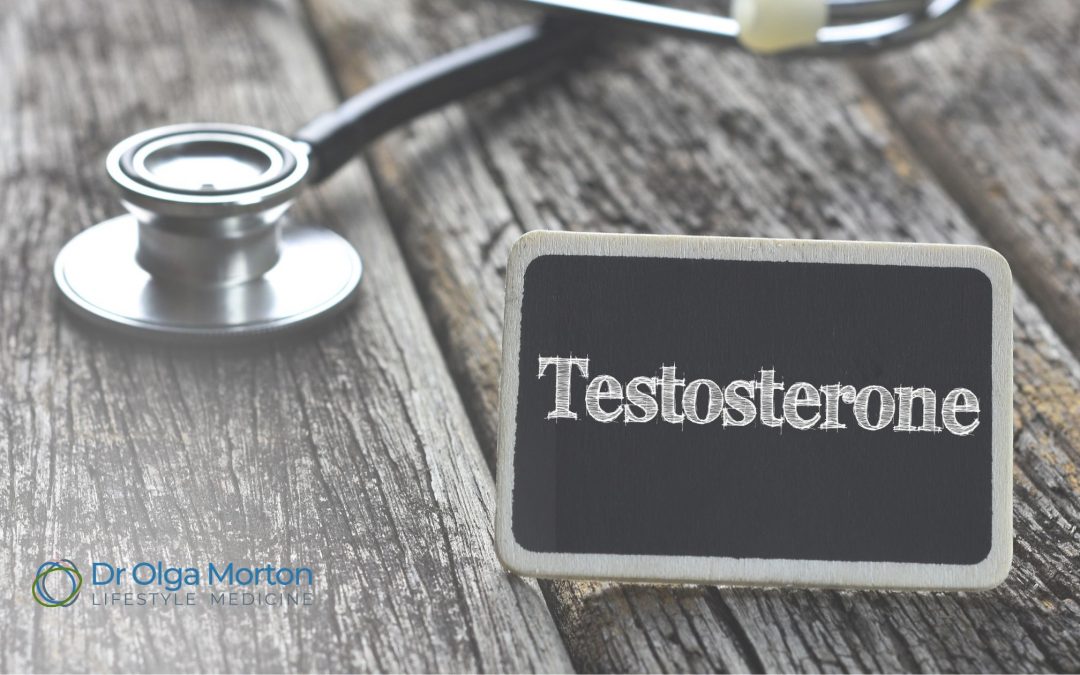When you hear about testosterone, you might think it’s all about men…
But actually, testosterone is just as important for women, and it often missed out of the conversation when it comes to balancing female hormones.
What if I told you, that you have been making a tiny amount of your own testosterone in your ovaries, your adrenals (small glands sitting above your kidneys) and your peripheral tissues (muscle and fat) all along?
But, just as with your main sex hormones, oestrogen and progesterone, your testosterone levels decline with age.
What happens when testosterone is low?
😞 Low Mood
Testosterone affects the production of serotonin and dopamine, your “feel good” hormones—and research suggests that restoring your testosterone levels can reverse the problem.
😇 Libido
Low sex drive is very common in women in all stages of menopause. Although testosterone might not be the only culprit, increasing it’s levels can have an incredibly positive effect on your libido, both sexual desire and sexual satisfaction.
🧠 Brain Function
Testosterone has an anti-oxidant effect and increases your brain’s cells resistance to stress.
It also increases the blood flow to your brain and may help with the dreaded brain fog, concentration and forgetfulness.
So, you might be thinking by now:
😫 Can I please just have my testosterone fixed already???
Well, testosterone replacement therapy can be helpful in some cases, BUT like with any medication, it does not come without side-effects (acne and excess hair are to name just a few).
It is not licensed in the UK and can be only prescribed off-license by menopause specialists.
Due to a lack of research on long-term safety, testosterone therapy isn’t right for women with heart, blood vessel or liver disease.
It’s also not safe for women with hormone-sensitive cancers.
Is there anything you can do to increase it naturally? 🤔
Here is what’s important:
- 🧘♀️Stress levels
Remember the “cortisol steal phenomenon” I’d mentioned in my earlier messages?
If your adrenals are exhausted and constantly over-worked by making stress hormones, there will be not much left for making sex hormones. Your body will be literally thinking “I need to run away from that tiger, and you want me to do what?”…
2. 😴 Deeper Sleep
Sleep is one of the most important times for hormone production. You make a lot of your oestrogen, progesterone, and testosterone during the deepest stages of sleep—and if you aren’t reaching those deep stages, your hormones can fall out of balance.
3. 🥑 Healthy fats in your diet
Because your sex hormones share the chemical structure of cholesterol, your need healthy fats in your diet.
I’m not suggesting you eat foods high in cholesterol, but healthy fats, like linseeds, nuts, avocado and wild-caught fish (if you eat fish) will help you boost those levels.
4. 🕰️ Intermittent fasting
Fasting is an amazing (and free) tool to reduce inflammation in your body and therefore, to increase the production of testosterone in your muscles and your adrenals, where testosterone is being made.
But you have to do it right and it does not suit all women. If you’re new to fasting, I recommend starting out slowly with a 12 hr over-night meal-free period and listen to your body.
5. 🌿 Aromatherapy
Various studies proved inhaling and massaging with Lavender, Neroli oil, Fennel, Rose, and Geranium essential oils balance cortisol and reduce stress and anxiety, and thus help your libido.
What’s verdict?
You need testosterone for everything from mood to brain function to sex drive, and low testosterone is a hidden issue for a lot of women, especially during and after menopause.
And the good news is…
With the right lifestyle changes, you can bring your hormones into balance. You’ll be amazed by how good you feel! 😀

